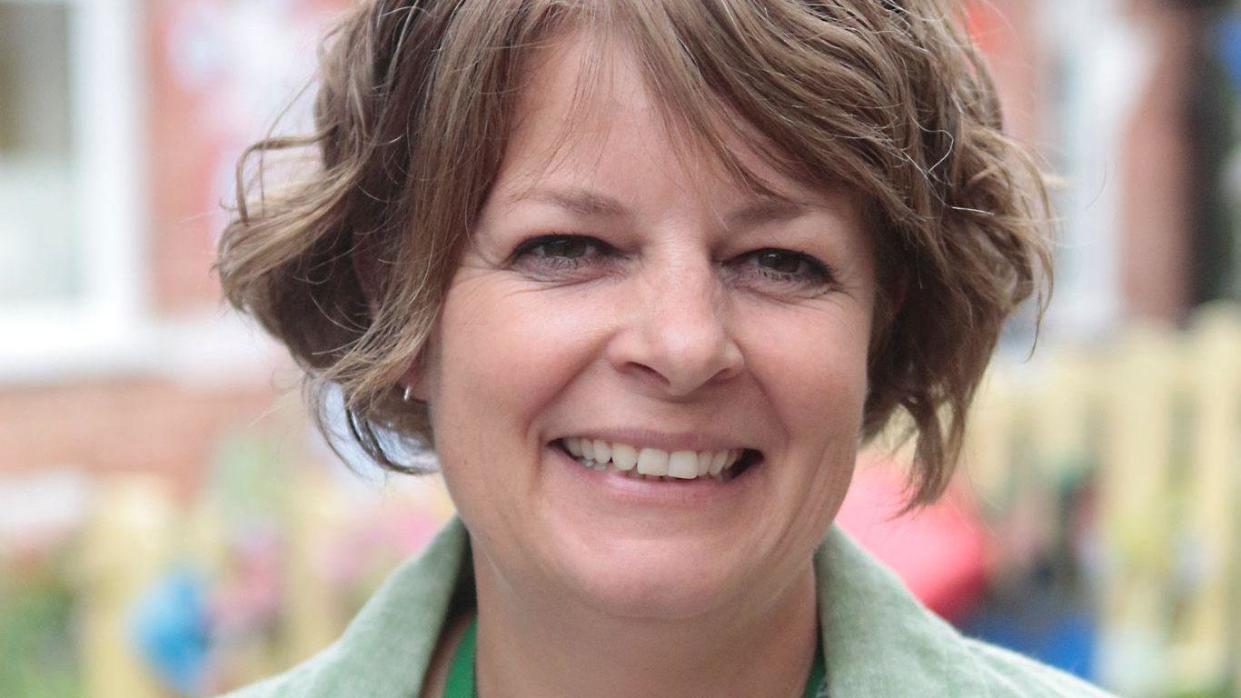Ofsted complacent after head's death, says review

Ofsted's response to a head teacher's suicide following a school inspection was "defensive and complacent", a major review has found.
Dame Christine Gilbert's independent review was commissioned after an inquest last year concluded that a critical Ofsted inspection "contributed" to Ruth Perry's death.
Ofsted chief inspector, Sir Martyn Oliver, accepted most of the review's findings and said it shone a light on "the power dynamic between the inspector and those being inspected".
The findings come after the government scrapped the practice of inspectors issuing an overall grade for a school - either Outstanding, Good, Requires Improvement or Inadequate.
Mrs Perry took her own life in January 2023 after learning her school, Caversham Primary in Berkshire, was set to be deemed Inadequate.
Despite senior Ofsted staff being told about her death that month, many staff and board members said a BBC News report two months later was the first time they had heard about it.
Dame Christine's damning review said Ofsted did not attempt to contact the school or Mrs Perry's family in the following months, and could have shown empathy by seeking to speak to them straight away.
'Completely dysfunctional'
Ofsted acted with a "lack of awareness" when it did release a statement in March that "seemed to imply that Ofsted had little to learn from the tragedy", the review said - adding that inspectors had been given the impression that the regulator had "done nothing wrong".
"Ofsted’s initial response appears defensive and complacent rather than reflective and self-critical," Dame Christine wrote, adding that inspectors and schools had described Ofsted as "unwilling to respond constructively to criticism".
She said Ofsted's own Big Listen consultation, with thousands of teachers, parents and children, found:
Ofsted’s culture creates feelings of stress, anxiety and apprehension among leaders and staff
Schools think inspectors should give more advice on how they can improve, instead of just descriptive reports
They want better collaboration from Ofsted, and consistency between inspections
Mrs Perry's sister, Prof Julia Waters, told BBC News that Dame Christine's review was "evidence of a completely dysfunctional organisation".
"Ofsted saw the death of my sister as a threat to their reputation, as a problem that had to be dealt with and they absolutely refused, at least externally, to admit that they could have done anything wrong.
"It is utterly hypocritical that they hold schools to such high levels of accountability when refusing to be held accountable themselves."
Dame Christine's recommendations include staff training for Ofsted's top officials and board members to improve communications to staff and schools, in crisis situations, and for Ofsted's board to promote an improved culture of openness.
She also said new training, for inspectors to spot when school staff are distressed or anxious, should be expanded, and "very specifically designed to reflect the unique power dynamic of inspection".
Ofsted said it would build on inspectors' mental health awareness with a new Ofsted Academy.
Ofsted published research on Tuesday suggesting strong support for school inspections from parents, many of whom use them to inform decisions about their children's education - but there was mixed support for single-word judgements.
Sir Martyn said Ofsted had done "much great work", but that his consultation had uncovered "much criticism".
"We are committed to reducing unnecessary pressure on the professionals we work with. But we also must continue to be honest about the state of the systems we inspect and call out poor practice, and unacceptably low standards for children and learners, without fear or favour," he said.
"This is the balance we must, and will, strike.
"Now it is time to act."
Changes Ofsted is making include:
From this month - pausing the publication of inspection reports when safeguarding concerns are identified in an otherwise high-performing school, until inspectors revisit the school within three months. This is to give the school a chance to fix the issues without intervention from the Department for Education
Under consultation - bringing in a new inspection framework, focused on pupil outcomes, but with various measures to reduce anxiety for staff being inspected
Under consultation - increasing focus on how providers are meeting the needs of vulnerable or disadvantaged children, with a specific focus on "inclusion" in report cards
Working with government to introduce new annual safeguarding, attendance and off-rolling reviews for schools.
Education Secretary Bridget Phillipson told BBC News that Dame Christine's review was "deeply concerning", and that she was "determined" to drive change alongside Sir Martyn.
Pepe Di'Iasio, general secretary of the Association of School and College Leaders (ASCL), welcomed the actions, saying there had been a “sea change” in Ofsted’s openness since Sir Martyn took on the role in January.
“Head teachers up and down the country will welcome… the idea that we’re going to see a better future,” he added.
The BBC has put several of the report’s findings to Amanda Spielman, who was chief inspector when Mrs Perry died. Ms Spielman declined to comment.
Dame Christine welcomed Ofsted's pledged actions, but said there was “some cynicism” about whether they would lead to "fundamental change".
The alterations announced by Ofsted only affect schools in England. Inspections in Wales are carried out by Estyn, in Scotland by Education Scotland, and in Northern Ireland by the Education and Training Inspectorate.
If you've been affected by the issues in this story, help and support is available at BBC Action Line
Additional reporting by Branwen Jeffreys, Hope Rhodes and Kate McGough.






